Department of Phonetics and Linguistics TQA SELF-ASSESSMENT |
|
Aims
More specifically, our programmes are intended to produce graduates
who have the following characteristics (within the limits imposed
by time and ability, and with some individual variation according
to their choice of options).
Scholarship. They know and understand:
Analytical skills. They can analyse linguistic data using:
Investigative skills. They can conduct smallscale research projects, in consultation with an advisor, in which they:
For the BSc, MSc and others (according to options) they can also:
Study skills. In producing essays and other material, they can:
Transferable skills. More generally, they can:
Attitudes. They can:
|
|
In the academic year 1994-5 there are 342 students based in this department (including 14 Affiliate students). Most of them are on either the four-year BSc Speech Sciences programme or the BA Linguistics programme. The remainder are spread across various BA Combined Studies programmes, a three-year BSc Speech Communication programme, various taught Masters programmes and postgraduate research. We draw attention to three characteristics of our student population (which are shown in more detail in Annex A):
There are 19 full-time HEFCE-funded members of teaching staff,
giving a staff:student ratio of 1:17.9 for tutorial responsibilities.
However, our total teaching load in 1993-4 was only 207.52 FTEs
because our students 'receive' more teaching from outside the
department than we give to students from other departments. This
is especially true of the BSc Speech Sciences, where we provide
about 30% of the core teaching, the rest coming from the National
Hospital's College of Speech Sciences (NHCSS; see Annex
D) and other UCL departments. In terms of actual teaching, therefore,
our staff:student ratio is 1:10.9. Of the 19 teachers, four are
under 40, and eight are women.
Not all of our teachers are HEFCE-funded. One particularly important
contributor is a British Academy Research Fellow, but 14 research
students or research assistants are paid to help (under the supervision
of a permanent member of staff, and according to College guidelines)
with tutorials, with marking, or as lab class demonstrators.
Most courses are taught by people active in research into the
subject concerned. The department's research has earned the top
rating in all three research assessment exercises. Two of the
staff are qualified Clinical Speech and Language Therapists, two
are Fellows of the British Academy and one is currently holding
a British Academy Research Leave grant. Our combined research
experience is unusually broad, ranging from speech/hearing science
through phonetics to linguistics; this breadth is reflected in
our teaching, and by the fact that we straddle two faculties (Arts
and Life Sciences).
We have four technical staff who maintain our laboratories and
computers, and 4.3 fte administrative and clerical staff. Several
of these staff-members make an important contribution to our teaching
by running the laboratories, the Listening Centre, the departmental
collection of reading material for students and the word-processing
courses, all described more fully below.
All teaching staff have their own offices where they can see students
individually or give small tutorials. Most offices are on a single
site, at 20-21 Gordon Square, on the edge of the main UCL rectangle,
only a few minutes walk from the main library, the refectories,
and the Students' Union. This main site also contains workshops
and an anechoic room (used for teaching and research).
The remaining teachers have offices in Wolfson House, five minutes
walk from the main site; there we have a range of special-purpose
teaching facilities (detailed below) as well as a library/seminar
room and a lecture theatre.
We have two common rooms for students, and a room for research
students. The common room on the main site has tables as well
as easy chairs, and is used by BA and MA students as a place for
working. There are several places nearby where students can buy
coffee and refreshments. The common room in Wolfson House, which
students share with staff, has facilities for making coffee and
snacks. The other main teaching centre for the BSc students is
the NHCSS, about 10 minutes walk from UCL, where they have another
common room.
We have two small lecture rooms on the main site, one for our
exclusive use, and one shared with other departments. Both are
suitable for classes up to 25, and both have movable furniture
which can be rearranged for group-based teaching. The one for
our own use has a permanent video player. For classes too large
for these rooms we use centrally timetabled rooms elsewhere in
UCL, though we favour rooms near to the main site.
We are fortunate in having two dedicated computer rooms on the
main site, with 12 networked 486 machines (and a laser printer)
which students can use when they are not needed for computer teaching.
We use them for word-processing courses and for courses which
involve programming. Our students can also use the computer clusters
which are provided centrally, but these are heavily booked. All
students have an account on the UCL mainframe computer which allows
them to use electronic mail (as an increasing number do). All
our offices are networked, which allows us to communicate by electronic
mail with each other (as well as with the outside world and even,
increasingly, with students); a lot of our internal communications
are about students, teaching or activities connected with 'Enterprise
in Higher Education' (the UCL scheme for introducing innovation
into teaching, mentioned again below). We already encourage students
to word-process essays, but from 1995-6 this will become a requirement
on the BA programmes. Wolfson House has the best suite of facilities in Europe for teaching acoustic phonetics to undergraduates, consisting of a laboratory, computer rooms and individual cubicles; these facilities can accommodate 18 students, so we can teach all 50 members of a BSc cohort in three shifts. Students have free access to laboratories for project work. Wolfson House also contains a Listening Centre with 10 well-equipped cubicles for audio and video use, recording rooms and a large library of recorded phonetic material which students are encouraged to use.
For photocopying we use either departmental photocopiers or the
very powerful machines provided centrally. Most of our classes
are based on specially prepared photocopied handouts so these
facilities are important for our teaching.
An important centrally-provided facility is the UCL Language Centre,
where our BA students often take practical language courses, or
even a course in TEFL, for which they are given course-unit credit
(and which may count towards their degree class). The Language
Centre can also help overseas students with their academic English.
On the main site we have a large departmental collection of articles and offprints for students to borrow. The main library for our students is, of course, the UCL library, with strong collections in both phonetics and linguistics (about 5,500 books and 80 current periodicals). The other linguistics collections nearby, at the School of Oriental and African Studies and the Senate House, can also be used. The BSc students also have automatic access to the library at the NHCSS. |
|
Design
We have a separate departmental sub-committee responsible for
each programme. Each sub-committee reports to the Departmental
Teaching Committee, chaired by the Head of Department. The hierarchy
of teaching committees continues through the relevant Faculty
Teaching Committee (on which we are represented) to the College
Teaching Committee (see also Quality Assurance and Enhancement).
Content
The content of all our programmes is designed to meet as many
as possible of our objectives:
Organisation
Undergraduate students take a combination of courses each of which
is taught and examined separately from other courses. At any one
time, it is normal for a student to be following about four courses
and for a member of staff to be teaching two. This pattern is
very helpful for all of us as it spreads the workload evenly across
terms and across years.
Although courses are taught and examined independently, they are
interconnected in the total programme so that advanced courses
build on elementary ones. When students join us they are given
a booklet for their programme which explains which courses they
have to do and which choices they can make; ultimately the decisions
are made in consultation with their personal tutor (whose role
is explained more fully under 'Student Support and Guidance').
There are lists and information sheets on our courses, and other
departments provide similar information on their courses.
The taught elements in the Masters programmes are mostly obligatory
but students have some choice. |
|
Teaching
Teaching methods vary according to the course, so the following
methods are all used:
We all do at least some of our teaching in small groups (at most
16, often four or five, sometimes one), and since we generally
also see students singly when we are advising them on projects
and essays or when seeing them as personal tutors, we are able
to get to know our students as individuals. Small group work constitutes
about 50% of each student's contact hours.
Because of our favourable staff-student ratios and our research
activities, our students all have a good deal of personal contact
with people who are making world-class contributions to research
in the subjects that they are studying. We all contribute to undergraduate
teaching, where most final-year courses make use of the teacher's
own current research; indeed, it is in the nature of our subjects
for current research to be mentioned even in first-year courses.
Students, especially postgraduates, are encouraged to attend 'interest
group' meetings. We have, as teachers, produced a number of books
for use in teaching. Between us we have written three popular
introductions to linguistics and four undergraduate textbooks
on specific areas, as well as monographs, dictionaries and edited
collections which are used in teaching; and one of us edits a
series of elementary textbooks. We coordinate Netphon, a government-funded
project for developing computer-assisted teaching of phonetics
and acoustics.
Most undergraduates and all postgraduates do a personal research
project in which, under guidance, they can themselves make serious
research contributions; for instance in one course students are
regularly encouraged to carry out original research on their own
local accent. A few undergraduates are regularly employed as research
assistants during the summer.
Learning
Some of the above methods are clearly more interactive than others,
but we recognise the need for students to participate actively
and we are continually reviewing our methods to encourage deeper
learning.
One obvious variation in the students' learning experiences is
in the number of contact hours. On the BSc programme students
typically have about 16-20 timetabled classes per week, in contrast
with about eight or nine for the BA programmes. We feel that the
BSc programme is overloaded, and we are exploring ways of reducing
the contact hours.
Assessment
We use a variety of assessment methods:
The dominant modes of assessment are invigilated examinations
(especially in the Masters programmes) and essays (especially
in the BA programmes). The variety of methods makes it possible
both to match assessment to the needs of the course, and also
to give students a range of alternative assessment experiences.
All written work, including essays, is double-marked internally,
and samples are sent to our external examiners. Scripts from all
centrally organised exams are anonymous. Students are officially assessed for each course, and told their marks, within the same academic year, and they may learn their provisional grades much sooner, so the official assessment system is an important source of feedback for students. Where a course is examined by essays, the students always see marked essays, with comments. Since we also tell students the formula that we apply in deciding their degree class the assessment system is very transparent and we have few complaints.
|
|
Progression Our recruitment policy is in line with UCL policy of not making offers without an interview (with exceptions, such as overseas applicants. We also make a positive attempt to encourage students from local inner-city schools:
In common with other departments of linguistics and phonetics,
most of our new undergraduates come to the subject with little
or no knowledge of the subjects. Our first-year courses in phonetics
and linguistics typically span the full range from school-level
basic grammar to theoretical controversies which touch the frontiers
of research.
However, the learning experience for our undergraduates does change
through their programme. First-year BA courses tend to favour
quite concrete learning - facts, concrete analytical skills and
some rather basic theory and principles, with course-work as the
dominant mode of assessment. Final year students deal with more
abstract theory and generality, and are being assessed by means
of substantial essays. As explained in Annex B, the 'major' subject
ensures at least some increase in difficulty, though students
who prefer to broaden their range of courses can do so. A similar
progression is true of the BSc, although there is greater emphasis
on analytical skills.
Progression to the next year in the undergraduate programmes is
conditional on satisfactory performance, which normally means
having passed at least three units for entry to the second year,
and at least 6 (BA) or 6½
(BSc) for the third. We monitor student progress collectively
in the main departmental teaching sub-committees for the BSc programmes
and for the BA programmes, and it is these committees that decide
whether or not to recommend the Faculty to allow a borderline
student to progress to the next year (in conjunction with the
other department in the case of Combined Honours students).
As explained above, the course-unit system guarantees year-by-year
feedback to the students on their progress, but most courses also
include some mechanism by which the students can gauge their progress
before the final assessment for that course - either marked coursework
and essays, or verbal feedback in practical exercise classes.
The figures in Annex A (Table C.1) show the progression rates
for students who were registered in November 1992. The figures
which cause concern are those for the BA Linguistics (and Combined
Honours) programme, where only 58% of the first-year intake of
43 students progressed to the second year. These figures are exceptional
but we are reviewing our monitoring procedures (in the departmental
teaching sub-committees) to make sure that we are always aware
of students with serious problems.
Achievement
If we measure achievement in terms of degree-classes the picture
is encouraging (see Annex A). In 1994, 67% of our finalists graduated
with a first or upper-second, and in the previous two years the
figures were 51% and 56% respectively. This is of course only
a crude measure of achievement. Our course-unit system allows
us to issue graduates with an official transcript showing their
exact marks in all the individual courses which they take, which
is far more helpful both to students and to potential employers.
Neither of these measures takes account of achievements in non-academic
areas of College life; for example, several of our students play
an active part in the running of the Students' Union (including
one elected as a sabbatical officer) and in student societies
or teams. We value such achievements, and do our best to help
students to reconcile the academic and non-academic demands on
their time. Even harder to measure is the confidence which many
of our students develop while living as students in London.
Our BSc graduates have no difficulty in finding suitable employment,
usually in clinical practice or research. For BA graduates the
employment picture is typical for humanities degrees, but naturally
with a bias to employment in jobs connected with language (e.g.
teaching or computing). |
|
Academic and pastoral support and guidance (student care)
are available for students at various levels:
In addition to the support that we provide, students provide a
certain amount for themselves, notably an active student society
(the Linguistics Society) which organises social functions and
provides volunteers to look after BA applicants when they visit
the College.
Learning resources
As explained in the Framework section, our physical resources
for teaching and learning - rooms, equipment, laboratories, libraries
- are generally of high quality. However, although our students
have access to more computers than in most Arts departments, the
spare capacity that we have at present will be exhausted when
more students use word-processors for essay-writing. This is a
College-wide problem which is being addressed at the highest level.
|
|
The BSc Speech Sciences programme is in a special position regarding
quality assurance because it is externally accredited by the CSLT,
who submit it to a thorough inspection of both the teaching and
the delivery system every five years. The last inspection visit
took place in 1994 when their verdict was very favourable.
For our other programmes the main source of external views on
the quality of our teaching is external examiners. UCL invites
all external examiners to comment on degree programmes, and the
relevant Sub-board of examiners has to respond to any criticisms,
confirming to the Faculty Teaching Committee that relevant actions
have been taken. External comments are always taken seriously;
for example, our externals were concerned about poor results in
two of our first-year BA courses, which we have now completely
reorganised. Under UCL regulations we also involve external examiners
in the design of new courses and programmes.
Conversely, the fact that eight of us have acted as external examiners
or CSLT accreditors in other institutions gives us external standards
of comparison for the examinable output of our teaching.
College Teaching Committee has recently directed that a steering
committee should be set up for each Combined Studies degree to
monitor continuously the quality of the programme. The Arts Faculty
is now in the process of implementing this policy.
Within UCL there is an ongoing review of all teaching by Faculty
Teaching Committees, reporting to the College Teaching Committee.
One part of this process consists of a review of all our degree
programmes and of the individual courses that they comprise. This
has recently involved our MA programmes, some of the BSc and BA
courses and the assessment arrangements for our BA programmes;
and the BA programmes are due to be reviewed in the near future.
Another part of the Faculty review is the introduction of a system
of peer observation of teaching, in which a colleague attends
one of our classes and comments to us on our performance.
The most important feedback on our teaching, of course, comes
from the students themselves. We have regular meetings for students
and staff in two Staff-Student Consultative Committees (SSCCs)
to discuss more general problems in the programmes. We have separate
SSCCs for BA/MA students and for BSc students, chaired respectively
by the BA and BSc tutors. For some years BSc students have elected
representatives who attend twice-termly meetings conscientiously;
but we have only just introduced this system for BA/MA students,
in the hope that it will make the consultations more effective
than in the past. The minutes from SSCC meetings go to the College's
Joint Staff-Student Committee via the Dean of Students.
Another route for student opinion to reach us is through the questionnaires
which they complete for each course. We have been using this system
routinely for some years, and it is now a standard part of our
teaching (also required by the College Teaching Committee). The
teacher passes the questionnaires to the Head of Department who
pursues any problems with the teacher concerned; general issues
are discussed in the relevant (departmental) teaching sub-committee,
and feed-back goes to the relevant SSCC on action taken. We take
student comment seriously; for example, we dropped a graduate
student from our list of teaching assistants after complaints
from the students, and we made group-work in one of our courses
optional, instead of obligatory, with the happy result that every
student opted for it! However, we are aware that at present there
is no guarantee that appropriate action has been taken; this is
a difficult problem to solve, but we are working on it.
The College Teaching Committee has subjected us to an internal
Quality Audit, in 1993-4, in which we received a generally favourable
report.
We are all committed to high-quality teaching that has at least
the traditional virtues - clear presentation and structure, academic
reliability, honesty, excitement and personal involvement. Most
of us have evolved our personal teaching styles during many years
of teaching experience, but five of us have attended courses in
recent years on teaching or student-care. Our research-student
teaching-assistants gain experience through attending a centrally-provided
two-day training course on small-group teaching before they start
teaching. Three of us belong to Faculty Teaching Committees (as
well as to our various deparmental committees) and two are assessors
in the HEFCE Assessment of the Quality of Education.
All academic staff participate in the College Staff Review and
Development scheme, with biennial reviews of their activities
and progress. These reviews are both retrospective and prospective,
allowing staff to reflect on their areas of strenght, of interest
and desire for further development and exploration, as well identifying
areas where the College Staff Development and Training Unit may
be able to provide assistance.
An increasing number of us are looking for more radical alternatives
to the more traditional teaching methods, so two of us have volunteered
to act as Departmental Enterprise Coordinators, responsible for
liaison with UCL's Academic Enterprise and Training Unit, whose
remit is to support innovation in teaching. The 'Enterprise in
Higher Education' scheme has been well received in UCL and is
about to become part of the College's permanent structure, at
the centre of a new unit for research and development in Higher
Education. In our Department it has led to several specific innovations:
Several of us also have a broader commitment to student welfare:
Historically we have tended to rely on informal structures within
the Department for controlling and reviewing our teaching. Increasingly
we have adopted the more formal arrangements described earlier,
with a Departmental Teaching Committee coordinating a range of
sub-committees for particular degree programmes. We welcome the
formal impetus that the Quality Assessment exercise is giving.
|
The basis for calculation is self-explanatory.
- The number of undergraduate applications received and offers
made refers to applications received by the UCAS closing date
in May and excludes those students applying through clearing.
- Intake refers to all Year 1 students registered for the programme
as at HESES94; as per the HESES definition of New Entrants (HEFCE
Circular 25/94, Annex A, para. 11), students re-taking the first
year of a programme are included as Intake whereas students entering
directly onto the second year of a programe are not.
- Student movements between courses between the opening of session
and the HESES survey date, applications through clearing and repeating
students may cause the figures to indicate a higher level of intake
than offers or applications.
- The Intake figures are consistent with Table B1.
- A-level points score is calculated from the best three A-level
grades per student (excluding General Studies) on the standard
basis of A = 10, B = 8, etc. AS levels may count towards the
total of three A-levels as an extra A-level (A = 5, B = 4, etc).
- Student age is reckoned at the date of the student's registration.
This table records student progress between two successive HESES
surveys (2 November 1992 and 25 October 1993), these dates being
chosen to allow for some settlement of numbers at the start of
the academic year and to be able to be reconciled with student
numbers returned to the HEFCE.
The basis for calculation is self-explanatory in this case.
The census date is six months after graduation |
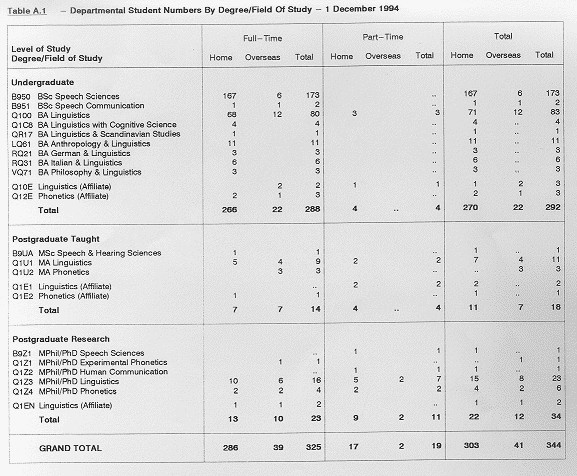
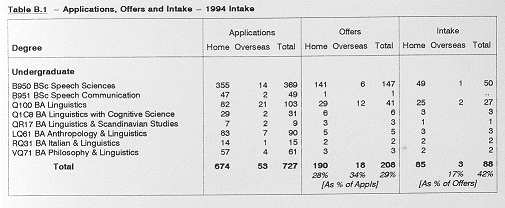
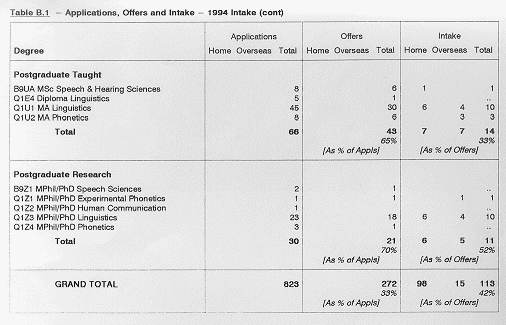
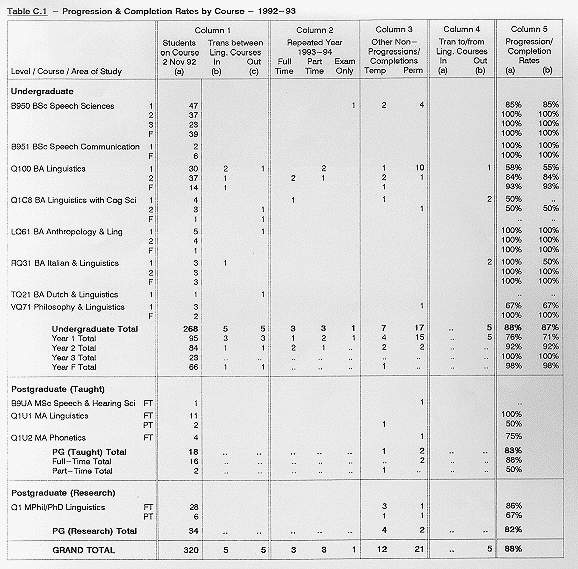
Notes
|
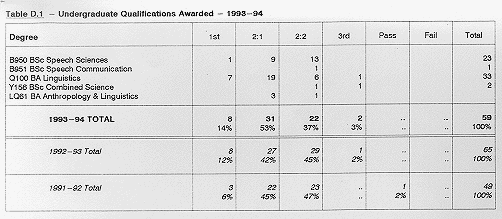
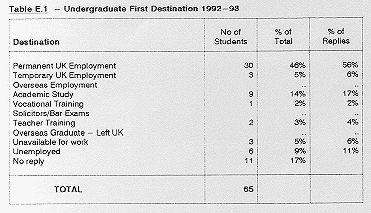
|
ANNEX B
Undergraduate
All but the first of these programmes takes three years (with
a year abroad for students who combine linguistics with a foreign
language).
As explained earlier, these undergraduate programmes are
all part of the University course-unit system in which
component courses have a value (generally 1 unit
or ½ unit), nine units
are required for a London University degree, and four units is
the maximum credits allowed per year. Every course is assessed
in the same academic year in which it is taken, and all assessment
is tied to specific courses. It is in these senses that we use
the terms programme, course and unit.
BSc Speech Sciences
This is a four-year degree. The normal load is four units in each
of the four years, and professional qualification as speech and
language therapist requires 16 units and recommendation from NHCSS.
To obtain the degree students must have taken at least 14 units,
and passed in at least 12. The structure of the programme is as
follows (courses are valued at ½
unit except where stated; the courses for which we have some responsibility
are in bold, and those for which we have sole responsibility are
also underlined).
BSc Speech Communication
This is a three-year degree whose first year is the same as for
the BSc Speech Sciences. The remaining years share many of the
latter's courses as follows:
BA Linguistics
We define three subjects as 'core' areas of linguistics: phonetics/phonology,
syntax and semantics/pragmatics. Students have to take at least
one unit (normally consisting of two separate one-term courses)
of each core subject, and they also have to select at least one
as a 'major' comprising further courses totalling two units, to
be taken through the second and third year. These requirements
mean that students take at least four core units, but we also
require them to take at least two more units of linguistics, so
at least 2/3 of the nine units they take (as a minimum) must be
in linguistics. However these requirements allow them to take
between three and six units outside the department, though few
students take more than one or two. The degree-class is based
on their best nine units subject to the above requirements, so
courses from other departments may contribute to the degree class.
One third-year option is a project or long essay, which most students
choose to do. A typical student path through the programme:
BA Linguistics combined with another subject
Students can combine linguistics with any of the following: Anthropology,
Dutch, German, Italian, Philosophy and Scandinavian Studies. At
present the programme for linguistics is the same for all combinations:
they must take at least ½
unit in each of the three core subjects (as defined for BA Linguistics),
at least 1½ units of
one core subject, and at least 4½
units of linguistics altogether. However we are planning to differentiate
the linguistics requirements slightly (e.g. by making phonetics/phonology
optional for philosophy students and sociolinguistics obligatory
for those doing anthropology), in order to increase the fit between
the two halves of the programme. A typical student path through one of these programmes:
BA Linguistics with Cognitive Science
Over the three years students are required to take a minimum of
4½ units of Linguistics
courses, which must include at least ½
unit in each of the core Linguistics areas (see the BA programme
above) and in one of these, students must take at least 1½
units, with at least ½
unit from the second-year list. In addition, students are required
to take at least 4½
units of Cognitive Science courses.
Postgraduate
The following are all one-year taught courses (with an obligatory
dissertation), but we also have 34 research students. Most courses
are dedicated to the Masters students.
MSc Speech and Hearing Sciences
There are six taught elements: issues in speech production, computer
speech processing, speech perception and computational linguistics,
and two options.
MA Linguistics
There are four taught elements. Three of the taught elements cover
the core areas of linguistics defined above for the BA Linguistics,
and the fourth is an option which students select from non-core
undergraduate courses.
MA Phonetics
There are four taught elements: general phonetics and phonology,
including practical phonetics; experimental phonetics; phonetics
and phonology of English, including intonation; an option.
Other teaching The vast majority of the courses that we teach are part of one of the above degree programmes, but we also provide one course each for three other departments (English, Italian and French), and one course for the Institute of Laryngology and Otology. |